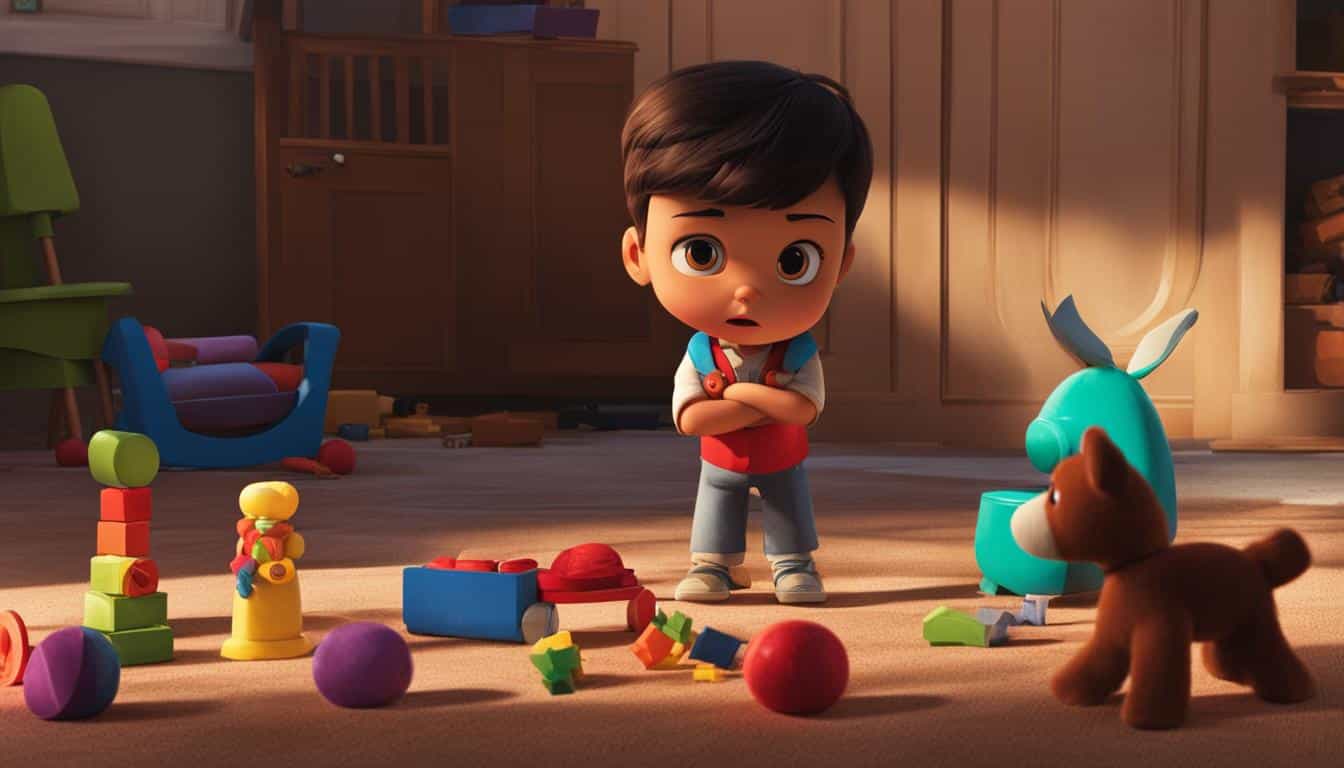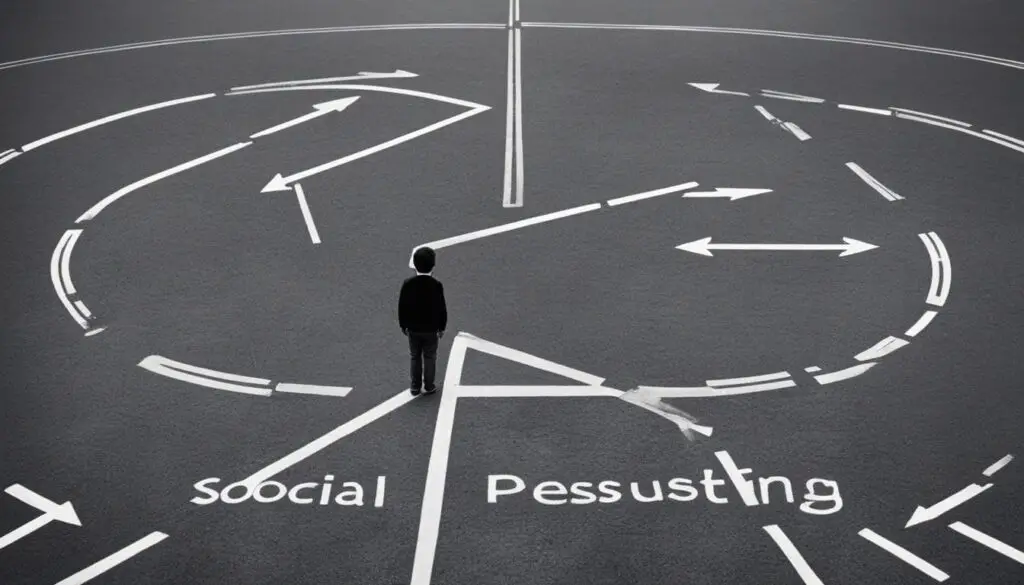
Understanding and Managing Childhood Aggression: Effective Strategies for Parents and Caregivers
As a journalist and child behavior expert, I recognize the crucial importance of understanding and managing childhood aggression. Aggressive behavior in children can often be challenging for parents and caregivers to deal with, but it’s important to address it early on to prevent negative outcomes.
Childhood aggression can range from physical aggression, such as hitting or biting, to verbal and relational aggression. It can be caused by a variety of environmental, biological, and social factors, which we will explore in-depth in the following sections.
Key Takeaways
- Childhood aggression is a serious issue that can have long-term negative consequences.
- Aggressive behavior in children can be caused by a variety of factors, including environmental, biological, and social influences.
- It’s important to recognize the different types of aggression and implement effective management strategies to prevent negative outcomes.
- Positive discipline techniques, teaching empathy, and promoting emotional regulation are effective strategies for managing childhood aggression.
- Seeking professional help from a child psychologist or therapist may be necessary for persistent or severe aggression.
Types of Childhood Aggression
Understanding the different types of aggression commonly seen in children is essential in managing their behavior effectively. The three main types of aggression are physical aggression, verbal aggression, and relational aggression.
Physical Aggression in Children
Physical aggression, also known as overt aggression, involves using physical force to harm others or damage property. Children who display physical aggression may hit, kick, bite, or push others, throw objects, or engage in other forms of violent behavior.
Physical aggression can be a symptom of an underlying issue, such as frustration, anger, or a need for attention. It is essential to identify the cause of physical aggression to address the behavior effectively.
Some common signs of physical aggression in children include:
- Intense and frequent outbursts of anger
- Physical fights with peers or siblings
- Damaging or destroying property
- Threatening or violent behavior towards animals
It is crucial to manage physical aggression in children promptly and effectively to prevent it from escalating into more severe forms of violence.
Verbal Aggression
Verbal aggression, also known as covert aggression, involves using language to harm others. Children who engage in verbal aggression may use insulting, threatening, or cruel language towards others or spread rumors and gossip.
Like physical aggression, verbal aggression can be a symptom of an underlying issue, such as low self-esteem, frustration, or insecurity. It is essential to address the root cause of verbal aggression to manage it effectively.
Some common signs of verbal aggression in children include:
- Using insults, name-calling, or teasing
- Spreading rumors or gossiping
- Threatening others verbally
It is crucial to teach children the importance of respectful communication and to provide positive role models for them to follow.
Relational Aggression
Relational aggression is a form of aggression that involves damaging or manipulating social relationships. Children who engage in relational aggression may exclude, gossip about, or spread rumors about others to harm their social standing.
Unlike physical or verbal aggression, relational aggression is often subtle and difficult to identify. It can be a manifestation of jealousy, insecurity, or social anxiety.
Some common signs of relational aggression in children include:
- Excluding others from social groups or activities
- Gossiping or spreading rumors about others
- Intentionally damaging or interfering with others’ friendships
It is essential to cultivate an environment of kindness and empathy to prevent relational aggression and teach children the value of healthy and respectful relationships.
Causes of Childhood Aggression
Aggression in children can be caused by several factors that interplay with each other, leading to disruptive behavior. In this section, I will discuss the three main contributors to childhood aggression: environmental factors, biological factors, and social influences.
Environmental Factors
Several environmental factors can contribute to childhood aggression. Family dynamics, particularly an unstable or hostile household, can lead to disruptive behavior in children. The img tag below illustrates how a violent home environment can affect children’s aggression tendencies.

“Exposure to violence at home is a risk factor for child aggression and antisocial behavior in adolescence”
Moreover, low socioeconomic status and poor living conditions, such as overcrowded homes and lack of play area, can also exacerbate aggressive behavior in children.
Biological Factors
Biological factors also play a role in aggressive behavior in children. For instance, abnormalities in brain development and neurotransmitter function may cause impulse control issues, leading to aggressive outbursts.
| Biological Factors | Details |
|---|---|
| Genetics | Research indicates that genetic factors account for 50-80% of aggression tendencies in children. |
| Brain Chemistry | Abnormalities in brain chemistry and neurotransmitters such as serotonin, dopamine, and norepinephrine may cause impulsivity and aggression. |
| Brain Development | Brain development impairments that affect the prefrontal cortex and amygdala, areas responsible for regulating impulses and emotions, may cause aggression. |
Social Influences
Peer pressure, social media, and exposure to violent media can influence children’s aggressive behavior as well. For instance, children who lack social support and feel disconnected from their peers or family members may be more prone to aggressive behavior. The img tag below showcases some of the social influences on children’s aggressive behavior.

By understanding the causes of childhood aggression, parents, educators, and caregivers can take steps to manage or prevent aggressive behavior in children.
Impact of Childhood Aggression
Childhood aggression can have significant short-term and long-term consequences on children’s emotional well-being, social relationships, and academic performance. The emotional consequences of aggressive behavior can include increased anxiety, depression, and low self-esteem. Children who are aggressive may struggle with regulating their emotions and have difficulty forming positive relationships with their peers and others around them.
The social consequences of aggression can be severe and long-lasting. Aggressive children may be rejected by their peers and ostracized from social groups, leading to feelings of loneliness and isolation. In addition, aggressive behavior can contribute to a negative reputation, making it difficult for children to build positive relationships in the future.
Academically, aggression can have a significant impact on a child’s performance. Aggressive behavior can lead to disruptions in the classroom and make it difficult for children to focus and learn. In some cases, aggressive behavior can result in academic consequences such as suspensions or expulsions.
It’s crucial to address childhood aggression early on to prevent negative outcomes. By taking an active role in teaching positive behavior and addressing aggressive behavior promptly and effectively, parents and caregivers can help children develop healthy coping strategies and positive relationship skills that will benefit them throughout their lives.
“It’s crucial to address childhood aggression early on to prevent negative outcomes.”
Strategies for Managing Childhood Aggression
As we’ve discussed, childhood aggression can manifest in many ways and have many underlying causes. Fortunately, there are several proven strategies that parents and caregivers can use to help manage aggressive behavior in children. These techniques focus on positive discipline and promoting emotional regulation.
Positive Discipline Techniques
Positive discipline techniques are an effective way to manage aggressive behavior in children. This involves setting clear boundaries and consequences for negative behavior, while also acknowledging and reinforcing positive behavior. By taking a proactive approach to discipline, parents and caregivers can help instill self-control and improve behavior in the long term.
“Positive discipline is about ensuring that children feel safe, loved, and valued so that they can learn and grow in a supportive environment.”
Teaching Empathy
Empathy is the ability to understand and share the feelings of others. By teaching children to practice empathy, they can develop a stronger emotional understanding of themselves and others. This includes encouraging children to talk about their feelings, identifying emotions in others, and practicing active listening skills. By promoting empathy, we can help children develop stronger social relationships and a more positive outlook on life.
Promoting Emotional Regulation
Emotional regulation is the ability to manage our own emotions and cope with stress in healthy ways. This is an important skill that can help children learn to control their impulses and manage aggressive behavior. There are many ways to promote emotional regulation in children, including mindfulness techniques, relaxation exercises, and effective communication skills.
By using these strategies to manage childhood aggression, parents and caregivers can help children develop healthier behavior patterns and emotional regulation skills. With consistent effort and support, children can overcome their aggression and learn to navigate their emotions in positive and constructive ways.
Seeking Professional Help
When dealing with persistent or severe aggression in children, it’s essential to seek professional help. Consulting with a child psychologist or therapist is an important step in addressing aggressive behavior. These professionals are trained to evaluate and treat a wide range of behavioral and emotional issues in children, including aggression.
Therapy for aggressive children typically involves identifying the root causes of the behavior and teaching strategies for effectively managing it. A child psychologist may use various techniques such as cognitive-behavioral therapy or play therapy to help children learn how to regulate their emotions and express themselves in healthier ways.
It’s important to note that therapy is not a quick fix, and progress may take time. Parents should be patient and supportive throughout the process and work closely with the therapist to implement strategies at home.
“Therapy has been a game-changer for our family. We were struggling to manage our child’s aggressive behavior, and consulting with a child psychologist has made all the difference. Not only has our child learned to manage his emotions better, but our family dynamic has improved as well.”
When seeking a child therapist, it’s essential to find a qualified professional who specializes in working with children and has experience treating aggression. Referrals from pediatricians, school counselors, or trusted friends and family members can be helpful in finding the right therapist.
Benefits of Therapy for Aggressive Children
| Benefits | Description |
|---|---|
| Improved Emotional Regulation | Therapy can help children learn how to express themselves in healthy ways and manage their emotions, reducing the frequency and intensity of aggressive behavior. |
| Better Social Relationships | Working with a therapist can also improve children’s social skills and ability to form positive relationships with peers and adults. |
| Improved Academic Performance | Addressing aggressive behavior can lead to better concentration, focus and academic performance at school. |
| Better Family Dynamics | As children learn to manage their behavior more effectively, family relationships may improve, resulting in better communication and cooperation at home. |
Conclusion
In conclusion, as a professional copywriting journalist, I have presented an overview of childhood aggression and the importance of understanding and managing it. I have explored the different types of childhood aggression and discussed the various causes of this behavioral issue, which can be attributed to environmental, biological, and social factors.
Childhood aggression can have a significant impact on children’s emotional and social well-being, which can also affect their academic performance. Therefore, it is essential to address it early on and implement effective strategies such as positive discipline techniques, teaching empathy, and promoting emotional regulation.
While it is crucial for parents and caregivers to take proactive measures to address aggressive behavior, seeking professional help is necessary in severe or persistent cases. Consulting with a child psychologist or therapist who specializes in working with children can provide valuable guidance and support.
I hope this article has provided valuable insights into managing childhood aggression and has helped readers understand the importance of addressing this issue for the overall well-being and development of children. By working together, we can help children navigate their emotions and develop healthier behavior patterns.
FAQ
What is childhood aggression?
Childhood aggression refers to a range of behaviors exhibited by children that involve intent to harm or cause physical or emotional pain to others. These behaviors can include physical aggression, verbal aggression, and relational aggression.
How common is childhood aggression?
Childhood aggression is a relatively common issue, with studies showing that a significant number of children exhibit some forms of aggressive behavior at some point in their lives. However, it’s important to note that not all children who engage in aggressive behavior will go on to develop persistent or severe aggression.
What are the risk factors for childhood aggression?
Several factors can contribute to childhood aggression, including environmental factors such as exposure to violence or harsh parenting, biological factors such as genetic predispositions, and social influences like peer relationships and media exposure.
How does childhood aggression impact children’s emotional well-being?
Childhood aggression can have significant emotional consequences for children. Aggressive behavior is often associated with higher levels of anger, frustration, and poor emotional regulation skills. This can result in feelings of isolation, low self-esteem, and difficulties in forming healthy relationships.
What strategies can be used to manage childhood aggression?
There are various strategies that can help manage childhood aggression. Positive discipline techniques, such as setting clear boundaries and consistent consequences for aggressive behavior, can be effective. Teaching empathy and promoting emotional regulation skills through activities such as role-playing and relaxation exercises can also be beneficial.
When should I seek professional help for childhood aggression?
It is important to seek professional help if a child’s aggressive behaviors are persistent, severe, or causing significant distress to the child or others. A child psychologist or therapist with expertise in working with children can provide assessment, guidance, and evidence-based interventions tailored to the specific needs of the child.
Is childhood aggression a predictor of future violent behavior?
While childhood aggression can be concerning, it’s important to note that not all children who engage in aggressive behaviors will go on to exhibit violent behavior in adulthood. The trajectory of aggression depends on various factors, including early intervention, supportive environments, and effective management strategies implemented during the child’s development.